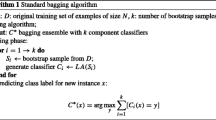Abstract
In this paper the performance of bagging in classification problems is theoretically analysed, using a framework developed in works by Tumer and Ghosh and extended by the authors. A bias-variance decomposition is derived, which relates the expected misclassification probability attained by linearly combining classifiers trained on N bootstrap replicates of a fixed training set to that attained by a single bootstrap replicate of the same training set. Theoretical results show that the expected misclassification probability of bagging has the same bias component as a single bootstrap replicate, while the variance component is reduced by a factor N. Experimental results show that the performance of bagging as a function of the number of bootstrap replicates follows quite well our theoretical prediction. It is finally shown that theoretical results derived for bagging also apply to other methods for constructing multiple classifiers based on randomisation, such as the random subspace method and tree randomisation.
Preview
Unable to display preview. Download preview PDF.
Similar content being viewed by others
References
Bauer, E., Kohavi, R.: An empirical comparison of voting classification algorithms: bagging, boosting, and variants. Machine Learning 36, 105–139 (1999)
Breiman, L.: Bias, Variance, and arcing classifiers. Tech. Rep., Dept. of Statistics, Univ. of California (1995)
Breiman, L.: Bagging predictors. Machine Learning 24, 123–140 (1996)
Buhlmann, P., Yu, B.: Analyzing bagging. Ann. Statist. 30, 927–961 (2002)
Dietterich, T.G., Kong, E.B.: Machine Learning Bias, Statistical Bias, and Statistical Variance of Decision Tree Algorithms. Tech. Rep., Dept of Computer Science, Oregon State Univ. (1995)
Dietterich, T.G.: An experimental comparison of three methods for constructing ensembles of decision trees: bagging, boosting and randomization. Machine Learning 40, 1–22 (1999)
Friedman, J.H.: On bias, variance, 0-1 - loss, and the curse-of-dimensionality. Data Mining and Knowledge Discovery 1, 55–77 (1997)
Friedman, J.H., Hall, P.: On bagging and nonlinear estimation. Tech. Rep., Stanford University, Stanford, CA (2000)
Fumera, G., Roli, F.: A Theoretical and Experimental Analysis of Linear Combiners for Multiple Classifier Systems. IEEE Trans. Pattern Analysis Machine Intelligence (in press)
Grandvalet, Y.: Bagging can stabilize without reducing variance. In: Proc. Int. Conf. Artificial Neural Networks. LNCS, pp. 49–56. Springer, Heidelberg (2001)
Banfield, H., Hall, L.O., Boweyer, K.W., Kegelmeyer, W.P.: A new ensemble diversity measure applied to thinning ensembles. In: Kittler, J., Roli, F. (eds.) Proc. Int. Workshop Multiple Classifier Systems. LNCS, vol. 2096, pp. 306–316. Springer, Heidelberg (2003)
Ho, T.K.: The random subspace method for constructing decision forests. IEEE Trans. Pattern Analysis Machine Intelligence 20, 832–844 (1998)
Kuncheva, L.I.: Combining Pattern Classifiers: Methods and Algorithms. Wiley, Hoboken (2004)
Kohavi, R., Wolpert, D.H.: Bias plus variance decomposition for zero-one loss functions. In: Saitta, L. (ed.) Proc. Int. Conf. Machine Learning, pp. 275–283. Morgan Kaufmann, San Francisco (1996)
Latinne, P., Debeir, O., Decaestecker, C.: Limiting the number of trees in random forests. In: Kittler, J., Roli, F. (eds.) MCS 2001. LNCS, vol. 2096, pp. 178–187. Springer, Heidelberg (2001)
Skurichina, M., Duin, R.P.W.: Bagging for linear classifiers. Pattern Recognition 31, 909–930 (1998)
Tibshirani, R.: Bias, variance and prediction error for classification rules. Tech. Rep., Dept. of Statistics, University of Toronto (1996)
Tumer, K.: Linear and order statistics combiners for reliable pattern classification. PhD dissertation, The University of Texas, Austin (1996)
Tumer, K., Ghosh, J.: Analysis of Decision Boundaries in Linearly Combined Neural Classifiers. Pattern Recognition 29, 341–348 (1996)
Tumer, K., Ghosh, J.: Linear and order statistics combiners for pattern classification. In: Sharkey, A.J.C. (ed.) Combining Artificial Neural Nets, pp. 127–155. Springer, Heidelberg (1999)
Author information
Authors and Affiliations
Editor information
Editors and Affiliations
Rights and permissions
Copyright information
© 2005 Springer-Verlag Berlin Heidelberg
About this paper
Cite this paper
Fumera, G., Roli, F., Serrau, A. (2005). Dynamics of Variance Reduction in Bagging and Other Techniques Based on Randomisation. In: Oza, N.C., Polikar, R., Kittler, J., Roli, F. (eds) Multiple Classifier Systems. MCS 2005. Lecture Notes in Computer Science, vol 3541. Springer, Berlin, Heidelberg. https://doi.org/10.1007/11494683_32
Download citation
DOI: https://doi.org/10.1007/11494683_32
Publisher Name: Springer, Berlin, Heidelberg
Print ISBN: 978-3-540-26306-7
Online ISBN: 978-3-540-31578-0
eBook Packages: Computer ScienceComputer Science (R0)




